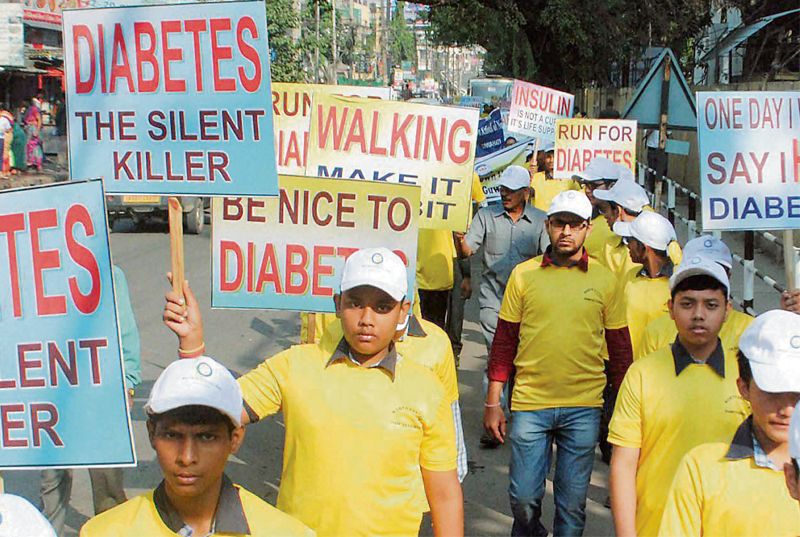
[ad_1]
Umesh CS Yadav
Professor, Special Center for Molecular Medicine, JNU
BEFORE Covid-19 was declared a pandemic by the World Health Organization (WHO) in March 2020, the world was already facing another pandemic: diabetes. According to the Global Burden of Disease Study 2017, published recently in the journal Scientific Report, the global incidence rate of diabetes in 2017 was 2.3 crore, while in the same year, a total of 47.6 crore of people were suffering from diabetes around the world, suggesting that its spread on a pandemic scale.
The same study indicated that India was second, with 6.8 crore of diabetic patients, while China, with nearly nine crore of diabetics, led the list. In every major country, a significant proportion of the population is affected by diabetes.
A year and a half after the Covid-19 epidemic, a significant number of cured patients have reportedly developed symptoms of diabetes, having high blood sugar, on an empty stomach and after meals. This problem is found even in people who have never had diabetes before contracting Covid.
A clinical study was carried out on a group of more than 550 Covid patients hospitalized in Italy to understand and document glucose-related abnormalities in recovered patients, two months after the onset of Covid. The results, published recently in a reputable scientific journal, Nature Metabolism, show that nearly half of these patients had sharply elevated blood sugar levels while a quarter had normal blood sugar levels. The remaining quarter had a history of diabetes or had recently been diagnosed with diabetes.
In a subset of recovered patients, the researchers found that the patients had impaired control of glucose metabolism, developed insulin resistance, and exhibited abnormal levels of cytokines. Some of these abnormalities were present even in recovered patients who had normal blood sugar levels, and symptoms lasted for at least two months.
Many recovered Covid patients have also shown what is labeled as ‘long Covid’ in which some of the symptoms, including high glucose levels, persist longer than expected. The study warned that these blood sugar abnormalities could be associated with the “long Covid” and require intervention and medical attention.
On average, these recovered patients reported a sharp increase in their sugar levels. Many of them needed diabetes medication or even insulin injections to control their very high blood sugar levels. Although in some patients the glucose level returned to the average level with medication after a few weeks or months, in many others high blood sugar persisted for longer. For others, the glucose would remain controlled with medication, but as soon as the medication was stopped, the higher glucose levels would return.
At the start of the pandemic, it was reported that Covid-19 was more severe in people with pre-existing diabetes and during the disease the sugar level could rise dangerously to over 400-500 mg per deciliter, by four -five times more than normal blood sugar.
This surge would jeopardize the immune system and weaken the body’s fight against the virus. In these patients, recovery from Covid was delayed, and at times, became fatal.
The increased incidence of diabetes in patients recovered from Covid has been attributed to steroids, such as dexamethasone which was administered to Covid patients in a rampant manner to control inflammation, particularly during the second wave of Covid This year.
Patients with mild symptoms of Covid, who did not need dexamethasone, took it anyway, and sometimes even without a doctor’s advice.
Steroids are known to raise blood sugar levels and taking a higher dose for a longer period of time could cause blood sugar levels to rise and stay high.
The study mentioned above also indicates that the increase in diabetes linked to Covid may be associated with the adverse effect of the virus on insulin-secreting beta cells in the pancreas. Researchers have observed aberrant beta cell function in Covid patients, which can eventually become depleted, leading to their death.
The famous “cytokine storm” that occurs during severe Covid is linked to the very high level of certain chemicals secreted by our own immune cells. These chemicals, including interleukin-6 and TNF-alpha, are also known to kill insulin-secreting beta cells.
Insulin is needed to control glucose levels by directing cells in the body to open doors and absorb glucose from the blood. But if insulin is not secreted, or if it is secreted but not effective, as in type 2 diabetes, the glucose we take in from food stays in the blood and accumulates. Cells and tissues are bathed in this high glucose level and are affected because high glucose levels are toxic and damaging to organs, including the arteries, heart, nerves, kidneys and eyes.
Once patients have recovered from Covid, the remaining beta cells can slowly regenerate and with proper management and care under the direction of a physician, diabetes acquired by Covid can be ‘cured’.
However, if the hyperglycemia persists for even a few months in recovered patients, it is likely that they were either genetically predisposed to develop diabetes or had diabetes before contracting Covid but did not know it.
To control the high glucose level in patients recovered from Covid, it is important that they regularly check their blood sugar levels, maintain a healthy body weight, and consume a balanced, low-sugar diet.
In addition, the sugar-controlling drugs, advised by the doctor, should be helpful in lowering the level of glucose as well as the damage caused by its surge during this period. Frequent blood sugar checks and adjusting the medication accordingly are also essential for faster recovery and progress towards normalcy.
The International Diabetes Federation has predicted that the global prevalence of diabetes will rise to 69.3 crore by 2045 in the absence of effective prevention methods.
Covid has fueled another pre-existing pandemic, going through the recent surge in the number of diabetic patients. More effective preventive and curative measures will be needed to contain this double whammy for human health.
[ad_2]
Source link
